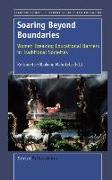- Start
- Soaring Beyond Boundaries: Women Breaking Educational Barriers in Traditional Societies
Soaring Beyond Boundaries: Women Breaking Educational Barriers in Traditional Societies
Angebote / Angebote:
Higher education systems in many countries are undergoing significant changes in response to variety of local, national, and international pressures. Among these, the shift from elitism to the provision of mass higher education, increased impact of internationalization and globalization, which are increasingly blurring national boundaries, increased competition among universities for limited resources to support higher education sector, the impact of technology and the knowledge economy, and the continuing quest educational for equity. While universities in many countries, both developed and developing, have worked diligently respond to various national and international demands, some issues persist, the continuing marginalization of women scholars. While many would agree that women, especially in Western contexts, have achieved significant accomplishments, research on academic women in the United Kingdom, New Zealand, Canada, Australia and the United States highlights concerns and challenges that confront women students and scholars, albeit with varying degrees. In many of these countries, women constitute at least 50% of the undergraduate student population and some graduate programs. However, there are continuing disparities in the representation of women scholars within higher ranks of the academy. Given what we already know about the position of women in the academy, what is so significant about account of women represented in this book? Lessons from colleagues in Western universities provide important models for understanding some aspects of gendered identity of women scholars, however, a deeper understanding of educational experiences for women in countries such as China, Turkey, Iran, Pakistan, may potentially offer innovative insights to our current understanding of gender within education. In this age of globalization, there are common themes that transcend the experiences of women across very different social, cultural, economic, and political contexts. Therefore, accounts of women scholars represented in this volume demonstrate that the experiences women scholars are not isolated incidents but global phenomena, and may offer alternative approaches to problems that seem insurmountable to women at the bottom of the professional ladder. Further, the experiences of non-Western women scholars are important because it is only through an understanding of their educational conditions that institutions can implement policies and practices to respond effectively, and to create work environments that are supportive to professional aspirations of these scholars. Effective policies can only be attained when there is a clear understanding of the barriers and challenges female scholars. Given that gender concerns, especially in non-Western countries, have historically occupied and to some extent continue to occupy a marginal position in the daily operations of institutions of higher education, it is critical to highlight their potentially harmful effects not only on women scholars, but on institutions as well.
Folgt in ca. 15 Arbeitstagen
